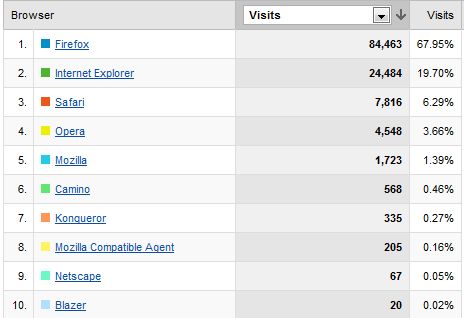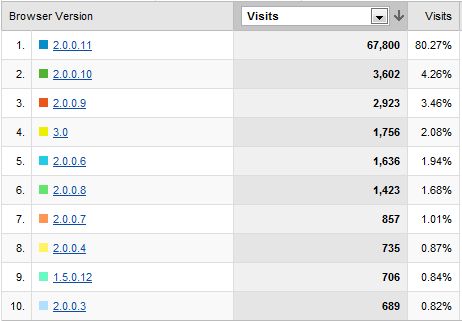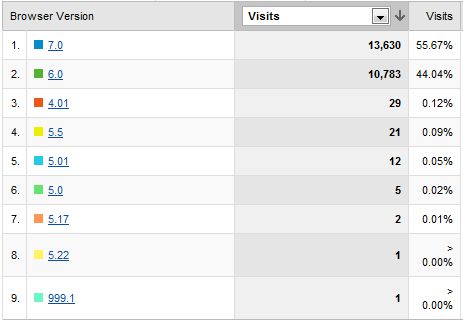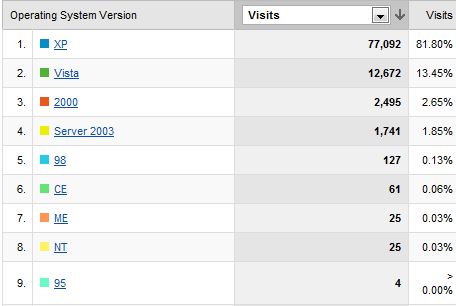
***UPDATE**** I really think people are misinterpreting this post. What I am trying to say here is that if Microsoft can get IE8 out there, and can get the majority of Windows users on it, then it will be a huge step. But I very much question whether this will happen. Read on to find out why. ****
With today’s news that IE 8 is now passing the ACID2 test, I started thinking about what that would mean to us web developers. (Well, I’m an asp.net developer, not really a web developer. It is like web development with training wheels, only the training wheels are really heavy, uneven, and make riding the bike harder. 🙂 Oh come on, have a sense of humor) So, what would a standards compliant IE8 mean for web developers? Call me cynical, but I honestly don’t think it will mean all that much for a long long (long long long long) time, and lets look at why I believe that.
Within the developer community, how many people still use IE anymore? (This has nothing to do with overall IE use, but just bear with me) Sure we have to all still account for it when we are doing our development, but how many of us actually use it for our daily browsing? In order to get some sort of idea, I decided to use the traffic from this blog. So, to get some recent data I pulled up Google analytics to look at my browser numbers on my site since December 1st.

This is probably about what you expected to see on a technically oriented site. You have about 70% Firefox, 20% IE, and then the last 10% is split among the rest of the browsers. Okay, this is all fine and good, but lets look at the breakdown of the numbers on Firefox…

Not too bad, we have over 80% on 2.0.0.11, and then over 2% on the Firefox 3 beta. Between 2.0.0.10 and 2.0.0.9 we have almost 8%. Of all Firefox users though, less than 1% are using Firefox 1 and even those are using Firefox 1.5. So, 99% of all of these users are on Firefox 2 or above even though Firefox 2 was only released just over a year ago.
Next, lets take a look at the same breakdown for Internet Explorer…

IE7 was released in October of 2006 as well, and so the time on market is almost identical. So, what is up with these numbers? Only 56% on IE7 and a full 44% on IE6! (Also, why in the world is there more IE 4.01 users than IE 5.5? Ha, that is an aberration if I ever saw one) Now, before you say, “but hey, IE7 is only available for XP and Vista. That is why so many people haven’t upgraded!” Well, that is B.S. Look at the numbers for Windows operating systems…

XP, Vista, and Server 2003 (all of which have IE7 available for them) make up almost 98% of all Windows users. So, apparently IE users just don’t want to upgrade. Why? I have no idea. Maybe they don’t like tabs, or hate the fact that they hid the File menu. The whole point is that if this is IE7’s adoption rate after it has been out for over a year, then what do you think is going to happen with IE8? Somehow I doubt that there is going to be a huge uptake, since I would imagine that in the non-technical crowd this problem would be worse. Also, Microsoft doesn’t have a new OS release to push IE8 out with either.
On top of all this, it appears that IE8 is going to require a special “head” tag (I keep seeing this, but I don’t know where it is coming from, so take it with a grain of salt) in order to turn on IE8 standards mode and if that tag is not there then it will render in IE7 “standards” mode. I completely understand their reasoning for this, but it just makes my head hurt. I guess most of the other browsers haven’t had to deal with this because they have mostly supported standards from the beginning and their users actually upgrade their browsers!
So, what does a standards compliant IE8 mean for us? Well, unless Microsoft forces users to upgrade when it is released (which just isn’t the way Microsoft does things), it means that sometime around 2013 when IE6 and IE7 are sunsetted, we might finally be able to stop worrying about stupid browser quirks in IE. But on the bright side, at least there is light at the end of the tunnel…even if it is a few light years away. So, what do you think, is IE8 going to change anything? Or am I just being jaded?
Loved the article? Hated it? Didn’t even read it?
We’d love to hear from you.





Pretty much all browsers have a standards mode and a quirks mode. For standards mode in the current versions of both IE and FF you need to set a DOCTYPE. If there is no DOCTYPE, both browsers will render in quirks mode. IE8 will be no different.
I think you are just loking at ur website and most probably only developers come to read ur site. But for the other web developers, it means that less IE-saving code and for the users, it means no more IE_only sites… you’ll be able to use ur fav browser for scouring the web!
The IE7 figure? Simple. IE7 was automatically installed by Windows Update, but only to legal Windows XP installations. About 50% of the XP installations are pirated.
Well, you’re right, and I also look at stats for big business-to-business site and thats even worse. Most IT-deparments are lazy and don’t allow people to upgrade.
2013? Looking at my users, more likely 2020…
I use Opera on top of WinXP. This works fine for me. Opera is quite stable and I can keep my browser opened for months (literally – I do it) with about a dozen tabs opened. You know, Firefox can’t cope with such a load, so I use it really when I need to debug some JavaScript with its awesome Firebug plug-in. Although it’s year 2007 already I still encounter some pages or services which require FF or IE. And in those rear cases I use IE, not FF, just because I got so many plug-ins installed on the later that it takes ages to load a page.
My point is why should I upgrade to IE7? It’s just yet another Windows update which would eat some free space on my hard drive and would make XP run slower. Let’s face it; every Windows Upgrade which one installs separately makes XP slower. That’s why I can’t wait to get SP3, thus I would get all those ‘critical’ and ‘highly-recommended’ updates in one shot. Of course, I SP3 makes me install IE7 along with new Media Player, I’ll get them as well. There’s nothing wrong with having legacy software, even if it’s a browser.
Another point is that not every user has admin rights, so they cannot upgrade.
Finally, IE6 works pretty fine compared to previous versions (like 4.01), so there’s no real necessity in upgrading for users.
OK, lets see. Until very recently, IE7 did a genuine windows validation check as well. And I reckon there are probably a few more dodgy copies of XP floating around the web dev community than in general. So, I’d hypothesise that some of your IE6 visitors haven’t updated to IE7 because they didn’t have a valid copy.
Could also be because visitors work somewhere that enforces IE6 usage, and isn’t ready to update yet.
Oh, and IE7 has been part of Windows updates, which is as close as you can get to forcing upgrades.
So yes, uptake of IE7 has been slower than some of us would’ve liked, but there are a LOT of people to convert. It’s easier to convince a group of Firefox users to update, than to convince a much larger group of IE users to all update.
But that’s still no reason not to really push for IE8 to improve as much as it can. It might not have a huge effect for a while after it’s released, but at least it will improve, instead of standing still at our current point of frustration.
Yeah, a lot of these are valid points. I thought about the pirated XP thing, but if I was in that boat I would just use Firefox since it doesn’t care what I am running on. You guys seem to think the numbers are much higher than I would have.
I have another numbers but the same idea:
Internet Explorer 100,314 62.86%
Firefox 50,480 31.63%
6.0 64,174 63.97%
7.0 35,502 35.39%
Almost 95% of FF users are with 2.0.x versions
So, 62% of my visitors use IE and from these, 63% still uses IE6…
IE 8? yeah, sure…
I think a standards compliant IE8 would be huge. It would be even better if they could get IE8 out as part of Vista SP2.
I agree, but I think perhaps you need to read the post better. If they can get it out there, and get Windows users on it, then it will be *HUGE*. My point is that unless it is used by the vast majority of users, we will be in the same place we are now.
The company I work for hasn’t updated to IE7 yet because we use a horrific web-based application for personnel management, and it’s coded specifically for IE6. I wish I could say it’s some in-house monstrosity, but it’s a vendor monstrosity, so there’s probably a fair number of other places in the same boat.
Of course, we’re also required to use Firefox for external browsing, but that sure isn’t 100% followed…
Will not mean anything right now, as soon as it released.
But if they never release a standard compliant web browser, it will not mean anything even in 2013
somebody must have said this already but, the point now is there is no way to make a compilant ebsite and let the users of IE to experience it correctly BECAUSE there’s no IE-compilant browser so it looks like we’re lame and made a crappy website, but if there’s a compilant one you just throw the ball to the other end "upgrade your browser" which means "it’s your fault as a user not mine as a developer"
Being that this is a technical site, you might find that many of your visitors are web developers that are keeping IE6 on their machine for backwards compatibility. It doesn’t explain why on Earth they would browse the web using it, but once you make the plunge to IE7, testing IE6 becomes a pain rather quickly.
The reason IE 6 is still so common is not that complicated.
It’s common for developers you said – developers keep it so that they can test their work on it. That’s all. If it works on IE 6, it probably will on IE 7. So at least test with IE 6.
That’s why I have IE 6 anyway – although I never use it except to test my work.
A couple of people commented that it may be mostly developers who are holding onto IE6.
According to onestat as of July 07 over half of all web users still used IE6…
http://www.onestat.com/html/aboutus_pressbox53-firefox-mozilla-browser-market-share.html
I’d hope IE8 does adopt standards, but I’d agree author that the benefit to developers will likely only be felt in the long term.
Interesting but might be a little misleading. How many bots are crawling your site using some random version of IE in the header?
As was already pointed out, the IE6 numbers are mostly due to piracy or corporate "security" ([i]grin[/i]). You may not think that piracy is such a high issue, and maybe it’s not in the US, but in third world countries like Uruguay here, people just don’t own windows licenses. When the minimum salary is [b]below[/b] the cost of a Windows license … what’s the point?
It’s easy and cheap to torrent down a win version and get over with it. [b]Even some hardware vendors sell PCs with pirated windows preinstalled[/b]. So it’s not that everybody is a "natural born pirate", even my grandma has a pirated win copy 🙂
Unless you are a company that might get checked out by the government (which means "not all companies", but those that have attracted some sort of attention), it’s highly unlikely you’ll buy a license (and this extends to other software too, specially expensive software like Adobe’s suite, or the likes).
For the record, I own a Mac and currently no pirated software is installed in it – I even bought a TextMate license as I value the developer’s effort and [i]it’s affordable[/i] – but as soon as I need Photoshop or something of the sort, I [b]will[/b] download a pirated copy. Heck, Adobe’s design suite’s license is higher than my monthly salary, which might not be the highest around, but it’s enough to pay for the rent, the bills, food and live "well enough".
Maybe – just maybe – the ‘just show IE users a page compelling them to use a standards-compliant browser’ is justified in this case (in this case it would read more like ‘your browser is out of date. click here to upgrade Internet Explorer to version 8’). The more of us that do it, the less of a distraction it will be for the end user.
ummm…since when is there a 1:1 correlation between windows users and ie users?
…by my quick count you have roughly 92k windows users and 24k ie users. please put a little thought into your analysis.
until you start actually analyzing the data pehaps you could place your head back inside your scrotum.
Where did I say there was a 1:1 correlation between Windows users and IE users? I was merely showing that only about 2500 Windows visits on the site came from versions that were incapable of running IE7. And no, not all of those are running IE, so the number must be smaller than that. Which means that this can’t be the reason why the IE6 usage is so high. Sorry, I was assuming that you could make that small leap in logic. My bad. 🙂
@defproc Honestly I don’t even test my blog in IE6. I couldn’t care less if people who decide to run a broken browser get a site that is a little fugly. But this isn’t a business site, so I can make that decision in order to save myself the time and effort.
one thing it will do is make Opera’s lawsuit against Microsoft essentially void, as the main thing Opera is pushing is that Microsoft’s IE browser restricted the growth of the web by not being standards compliant
"The company I work for hasn’t updated to IE7 yet because we use a horrific web-based application for personnel management, and it’s coded specifically for IE6."
I don’t use IE but the people who I know who do use IE tend to use IE6 for exactly this reason. Microsoft’s strategy of convincing devs code to IE is a serious problem because it ties people not only to a specific browser but also a specific version of that browser.
@Brian I definitely agree that Microsoft’s strategy of putting proprietary features into browsers and then getting people to code for them, then sunsetting those features will cause them many headaches. One company I used to work for actually used XML Data Islands pretty extensively in their product. I mean, come on! It is a good thing that developers and companies are *much* more wary of these thing nowadays.
You know, it is very much less annoying to your users when you say "please upgrade to the latest version of your favorite browser for the best experience on my site" than if you say "please switch to my favorite browser for the best experience on my site". So I think it really hinges on whether it really does become easier to design a site to work in all the latest ACID2 compliant browsers than with the last three versions of IE. If so, the same lazy web developers that coded for IE only will ensure that many new sites will rapidly become incompatible with IE6 and IE7. Maybe even by 2010!
The slow adoption for IE 7.0 should be attributed to all the pirate copies of XP around. If you don’t have a legal copy you can’t install IE7.0 or SP2 or at least is very difficult.
Firefox in the other hand make easy, fast and friendly to upgrade.
I still think that there is some value on IE 8.0 supporting standards out of the box I don’t want more crazy stuff, they may implement whatever they want in Silverlight, but html, javascript, css, xml, etc, should be rendered, parse and executed the same in all browsers.
We can see it today, the war is moving from the Browser to the Rich Internet Experience platforms like Flash and Silverlight.
I run IE6 for testing, IE7 for testing, the latest Safari and Opera for testing, and the latest Firefox for testing and debugging and most of my surfing.
As noted, things’ll be lovely in a few years when IE8 and beyond are the dominant MS browsers. Til then, I’ll just continue to make sure sites look good in all the above.
It’d be nice if IE8 were just written to Win32. That’d let it run on anything from Win2K onwards. It’d also be nice if the interface chrome was plug-in-tweakable-enuf so that you could give it the look of IE 6/7/8 or cool/easy/user-tweaked-custom. But I’m not holding my breath.
It will be nice when we live in a totally acid2 dev world. acid3 will be even nicer. Cleanth and simplicity in coding will keep getting easier. Keep up the pressure, fellow standards-huggers.
— stan
My web sites;
IE %73
FF %20
Others %7